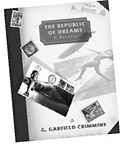Paul Auster is a writer who delights in confounding the reader. He does so by laying his emphasis on the strangeness of the world, especially its coincidences, which may or may not be a part of some larger plan (or, in the metafictional sense, some larger narrative). There is a definite Auster tone—dark, puzzled, eloquent, yet not at ease in the world—demonstrated in such novels as City of Glass, Leviathan, The Locked Room, and even in the post-apocalyptic In the Country of Last Things. He often brings into his stories a character who is a stand-in for Paul Auster, in one case is even named Paul Auster, who is a writer or seeker or some combination of the two. After a period of confusion or perplexity, you catch on: this is not due to a poverty of imagination, but rather in the service of a larger question of identity, of the randomness (or lack thereof) of storytelling and life and the writer’s job in the midst of it.
Timbuktu by Paul Auster (Henry Holt & Co., $22)
Then, just as soon as you think you have Auster under your belt, he confounds again. A few years ago, it was Mr. Vertigo, a novel about a boy who can fly in a turn-of-the-century sideshow world. The story is told in the voice of a tale, a tall tale that challenges the reader to believe the unbelievable and, at the same time, questions the authority of the narrator. All told, a clever performance. After a couple of interim works—screenplays, translations, memoir, essays—Auster has written a slender novel called Timbuktu, an account of the death of a saint, one Willy G. Christmas, told from the point of view of his dog, Mr. Bones. Willy is a poet, a philosopher, and a wanderer, a man who has refashioned himself in the image of his miraculous vision, Santa Claus. Together with Mr. Bones, he has brought himself down from New York to Baltimore to die, and, more importantly, to find his old grade-school teacher Bea Swanson. Willy is convinced that Bea will not only rescue his life’s work from a locker in the New York Greyhound bus terminal, but will also provide Mr. Bones with a home once Willy is gone.
Willy’s death and Mr. Bones’ subsequent search for the right kind of life forms the bulk of Timbuktu, and as such I found it rather thin. Once again, I was surprised by the novel’s voice. Mr. Bones (filtered through an all-seeing narrator) has a great deal of doggy charm, but the language is unexpectedly flat, even for a dog. There are lovely moments, as when the narrator muses, “Mr. Bones understood. He always understood what Willy said to him. This had been the case for as long as he could remember, and by now his grasp of Ingloosh was as good as any other immigrant who had spent seven years on American soil.” But for the most part, the novel is the sort of effluent saga you might hear from a drunk you have unhappily landed next to in a bar. “It feels good to let the purple stuff come pouring out sometimes,” Willy says, and pour out it does.
Willy Christmas, a Jew who becomes a kind of saint because of a vision, lives a selfless life and dies a pauper’s death. He’s redeemed at the last moment by Bea Swanson. His most devoted disciple is cast out into the world and must apply his master’s teaching without his corporeal presence, and makes a last-minute choice for transcendence. Timbuktu (the title refers to the place Willy claims he’s headed for after death) is the story of a saint and a young soul who must come of age. This may not be Auster’s best book, but he is an author to whom I’ll give the benefit of the doubt. For all his confounding qualities as a writer, he’s still worth thinking about.






